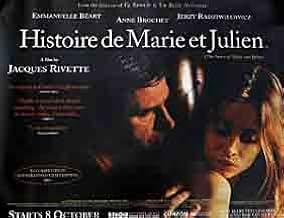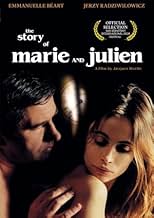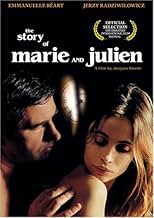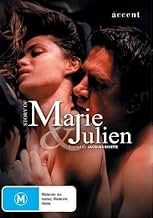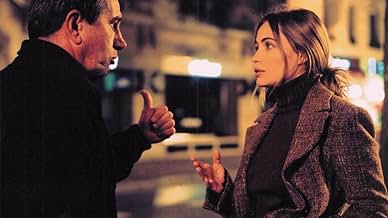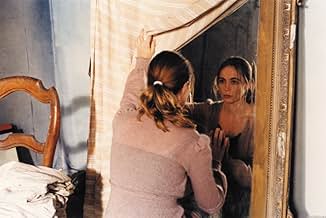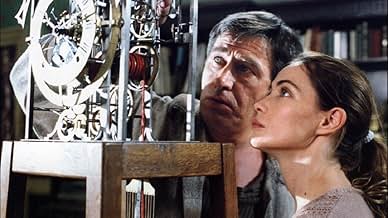अपनी भाषा में प्लॉट जोड़ेंMiddle-aged Julien lives alone with his cat. He dreams of Marie, and a few minutes later, he sees her on the street and makes a date. He asks her to move in with him, and she does. Her boyfr... सभी पढ़ेंMiddle-aged Julien lives alone with his cat. He dreams of Marie, and a few minutes later, he sees her on the street and makes a date. He asks her to move in with him, and she does. Her boyfriend is dead, the rest of her past a mystery. Although they quickly seem to fall in love, ... सभी पढ़ेंMiddle-aged Julien lives alone with his cat. He dreams of Marie, and a few minutes later, he sees her on the street and makes a date. He asks her to move in with him, and she does. Her boyfriend is dead, the rest of her past a mystery. Although they quickly seem to fall in love, she sometimes pulls away suddenly from him, is distant, and spends the night in a hotel. S... सभी पढ़ें
- पुरस्कार
- कुल 1 नामांकन
फ़ीचर्ड समीक्षाएं
1.Admit up front that the only reason you attended a screening was because you always wanted to be seen at a film festival and because you happen to have a thing for an actress (what does her attire at the festival have to do with the film at all?)
2.Admit that you didn't even make the effort to sit through the entire film.
By doing these two things you immediately discredit yourself as a critic (casual or professional, it does not matter) and as a serious movie goer. Why don't you save such trivial opinions for Spielberg and Cameron movies, where people might care? When viewing a film from a director with Rivette's past, one can't expect light fair at a lightening pace. I suppose you expect an action film from Godard or Tarkovsky too? I will myself admit that it was not a fantastic film, but the reasons for which these others so unjustly scrutinize the film are the exact reasons that make it interesting. I personally could have watched Julien toy with his clocks and his cat "Nevermore" and Marie 'set up house' the entire two and a half hours. The territory that this film explores is the relationship between two individuals and how their own consciousness relates to the cinematic narrative through these relationships. Granted this topic of "the abyss" between two lovers or siblings is common fair in high-culture drama, yet it becomes nonetheless intriguing for the patient spectator in that it eventually dives into the terrain of low-culture genre film. The subject chosen by M. Rivette is expertly relayed through painstaking detail and precision, something absolutely necessary to it, and something that can only be accomplished after a lifelong devotion to the cinematic medium. If he had done this movie 30 years ago when he first started filming it, before giving it up until now--thats right folks and mindless commentators, 25 years before the movies its said to have ripped off--I'm not sure he would have created a similar film, one infused with a comparable, patient interrogation of human relationships and suffused with the same amount of warm compassion and empathy for his characters.
The film requires from its audience constant participation to grasp its narrative subtleties and the patent exploration of abstract concepts such as time (cf. the last line of the film is "give me some time"; Julien is a clock meddler), the fusion of dream and reality (the first chance meeting is initially dreamt but occurs immediately afterwards; Marie's dreams command her actions when awake), guilt and redemption (the subplot involving the blackmailed woman and their sister) etc. The cyclic structure of the film with four chapter denoting different, albeit subtle, shifts in narrative perspective invite the viewer to adjust his approach according to the tonal modulations of the unfolding story. The reflexive nature of the filmic story becomes, thus, a vehicle for self-examination on behalf of the viewer of held preconceptions and ideas related to the issues unravelled within the film.
A uniquely rewarding movie for those willing to be engaged in its narrative discourse. The work of a master.
Can't they understand that, to share something with the others, it's important to have some ideas (just a small one, please...) about the movie itself? Do they think that when they proclaim their boredom they are giving to the world some kind of undisputed law?
Is it so difficult to understand that the Rivette work cannot be understood by the rules of mediocre entertainment? Is it so painful to address the simple idea that Rivette keeps filming the mystery of love? And that he doesn't want to bore us with the vulgar ideas of a vulgar TV-movie?
This much is certain: compared to what is surely Rivette's biggest claim to fame, 'La belle noiseuse,' this is far more abstruse in its artistic machinations. Here he and his co-writers blend together drama, romance, and mystery with the supernatural, a sad and ultimately kind of depressing story of love, tragedy, loss, and farewells. Unlike that picture of twelve years prior, in which four hours passed incredibly smoothly and beautifully, these two and one-half hours are most definitely felt as the narrative crawls sideways as much as forward. Down to the last few spoken lines of dialogue I don't know if everything Rivette and his collaborates intended is fully and perfectly communicated, yet be that as it may, and even with the length in mind, by and large I think this is splendidly well done. With or without the less evident intentions I think the storytelling could have been tightened, but regardless there's welcome complexity and lush detail in the writing of the characters, scene writing, and overall plot, and the dialogue tends to simply add another layer of flourish and ingenuity. Similarly, one readily discerns the utmost finesse in William Lubtchansky's cinematography, with more discrete emphasis on lighting than one customarily sees in modern cinema. Not to be counted out, the production design, art direction, costume design, and hair and makeup are all terrific, very easy on the eyes as they lend to the artful airs about the proceedings. In this instance I think the cast are a little less noteworthy than the otherwise construction, but all perform admirably, and of everyone in front of the camera Emmanuelle Béart definitely stands out most; her role requires splits between charged emotions and gratifying nuance, and she navigates that space most deftly.
As suggested, I think 'Histoire de Marie et Julien' is something I'd appreciate more if I sat for it a second time, and perhaps with a more focused mind. I recognize that there are doubtlessly subtleties here that I'm just not picking up on - or at least, I hope that's the case, because the alternative is that I'm giving Rivette too much credit. Some of my favorite movies share far more in common with this than not; this is an example that just doesn't meet with the same success for me. Even so, I did enjoy this feature, and I think it deserves a look, even if it's less than totally impeccable. Given the pointedly subdued tone this maintains, and the storytelling that's less than completely straightforward, I can understand how this won't appeal to everyone, and I'd suggest it most for those who are already receptive to the more arthouse side of the medium. Yet while the film is no great revelation by any means, I think it's well done even as I see it, and other attentive viewers will unquestionably get still more out of the experience. Temper your expectations and don't go out of your way for 'Histoire de Marie et Julien,' but if you do have the opportunity to watch, it's worth exploring.
क्या आपको पता है
- गूफ़When we see Marie choosing chairs to place in the garret, after she removes the second chair and returns to the garret empty-handed, a small stool is inexplicably where the chair had been.
- भाव
Marie: [during sex] I'm a warrior.
Julien: An amazon.
Marie: No. I keep my breasts for you, my friend. we're in the middle of a plain, a dessert.
Julien: Around us, a horde. It's our first battle.
Marie: I take over, come on top of you. I hunger for you. I eat you till I'm sick.
Julien: You tear me apart with your teeth, your nails.
Marie: You eat my sex.
Julien: It smells like wet soil. I stick my tongue and fingers in. Smell.
Marie: It's true. It smells like wet soil.
Julien: You faint. I take you in my arms. I take you...
Marie: Far... far from the battleground.
Julien: You wake up... you cry... scream.
Marie: You will deliver me.
- साउंडट्रैकOur Day Will Come
Written by Mort Garson and Bob Hilliard
Performed by Blossom Dearie with Joe Harnell et son quartet, Joseph Harnell (as Joe Harnell) (piano) - Dick Romoff (bass) - Ted Summer (drums) - Jerome Richardson (flute)
© 1962 publishing by Better Half Music and MCA Music Publishing (Renewed), A.D.O. Universal Studio
(p) DIW Records/disk union Co., Ltd.
Avec l'aimable autorisation de Unisersal Music projets spéciaux
टॉप पसंद
- How long is The Story of Marie and Julien?Alexa द्वारा संचालित
विवरण
बॉक्स ऑफ़िस
- दुनिया भर में सकल
- $66,543
इस पेज में योगदान दें


